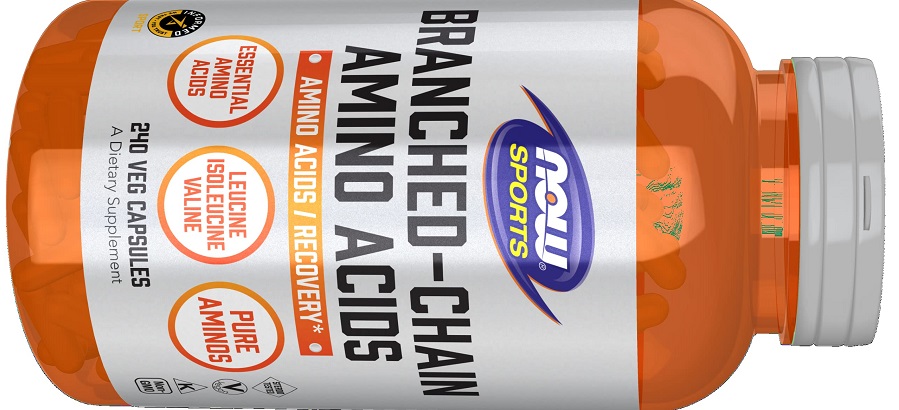Branched-chain amino acids (BCAAs) are a group of three essential amino acids: leucine, isoleucine, and valine. They are considered "essential" because the body cannot produce them on its own and they must be obtained through diet or supplementation. BCAAs make up about one-third of muscle protein and are important for muscle growth and recovery. They can also help reduce muscle soreness and fatigue during exercise. BCAAs are commonly used by athletes and bodybuilders to enhance performance and recovery, but they may also have potential benefits for people with certain medical conditions, such as liver disease and certain genetic disorders. They are often found in supplement form, and also can be found in food sources such as meat, dairy, and legumes. It's important to note that while BCAAs can be beneficial, they should be used as part of a balanced diet and exercise routine, and not as a replacement for other important nutrients. Consult with a healthcare professional or a qualified nutritionist before adding BCAA supplement to your routine.
What are the three essential amino acids that make up BCAAs?
The three essential amino acids that make up BCAAs are leucine, isoleucine, and valine.
-
Leucine is considered the most important of the BCAAs as it has the greatest impact on muscle protein synthesis and has also been shown to have potential benefits for bone health.
-
Isoleucine is important for glucose uptake by muscle cells and can also be used as a source of energy during exercise.
-
Valine is important for muscle repair and tissue regeneration, and it also helps to prevent muscle breakdown.
How much of muscle protein is made up of BCAAs?
BCAAs make up about one-third of muscle protein, specifically the three BCAAs Leucine, Isoleucine and Valine are found in high concentration in muscle tissue, and they are considered essential amino acids, which means they cannot be produced by the body and must be obtained through diet or supplementation. These three amino acids are important for muscle growth and recovery, they play a vital role in protein synthesis and they can help reduce muscle soreness and fatigue during exercise.
What are the potential benefits of taking BCAA supplements for athletes and bodybuilders?
Some potential benefits of taking BCAA supplements for athletes and bodybuilders include:
-
Increased muscle growth and recovery: BCAAs stimulate muscle protein synthesis, which is the process by which cells build new proteins. This can lead to increased muscle growth and recovery.
-
Reduced muscle soreness and fatigue: BCAAs can help reduce muscle soreness and fatigue by reducing the buildup of a compound called serotonin in the brain that contributes to feelings of fatigue.
-
Improved endurance: BCAAs can be used as a source of energy during exercise and can also help to delay fatigue.
-
Increased fat loss: BCAA supplementation may help to increase fat loss by increasing muscle protein synthesis and reducing muscle breakdown.
-
Improved immune function: BCAAs may help to improve immune function by reducing the risk of infection and inflammation.
-
Reduced muscle wasting: BCAA supplementation may help to reduce muscle wasting in people with certain medical conditions, such as cancer or liver disease.
It's important to note that while BCAA supplementation may offer these benefits, they should be used as part of a balanced diet and exercise routine, and not as a replacement for other important nutrients. Consult with a healthcare professional or a qualified nutritionist before adding BCAA supplement to your routine.
Can BCAAs help reduce muscle soreness and fatigue during exercise?
BCAAs may help reduce muscle soreness and fatigue during exercise. BCAAs can reduce muscle soreness by reducing the buildup of lactic acid in the muscles, which can cause pain and stiffness. Additionally, BCAAs can also reduce muscle soreness by reducing inflammation, which is a common cause of muscle pain.
BCAAs can also help reduce fatigue by reducing the buildup of a compound called serotonin in the brain that contributes to feelings of fatigue. This is because during exercise, the body produces more serotonin, which can cause fatigue and make it harder to continue training. BCAAs can reduce serotonin levels, which in turn can lead to less fatigue and improved endurance during exercise.
It's important to note that while BCAAs may offer these benefits, they should be used as part of a balanced diet and exercise routine, and not as a replacement for other important nutrients. Consult with a healthcare professional or a qualified nutritionist before adding BCAA supplement to your routine.
What medical conditions may benefit from BCAA supplementation?
Medical conditions that may benefit from BCAA supplementation include:
-
Liver disease: BCAAs may help to improve liver function in people with liver disease by reducing the accumulation of toxic compounds in the liver.
-
Muscular dystrophy: BCAAs may help to improve muscle strength and function in people with muscular dystrophy.
-
Genetic disorders: BCAAs may help to reduce the symptoms of certain genetic disorders such as Maple Syrup Urine Disease (MSUD) and Phenylketonuria (PKU)
-
Cancer: BCAA supplementation may help to reduce muscle wasting in cancer patients undergoing chemotherapy or radiation therapy.
-
Wound healing: BCAAs may help to promote wound healing by stimulating the growth of new blood vessels and skin cells.
-
Brain function: BCAAs may help to improve brain function by reducing the risk of dementia and other age-related cognitive decline.
It's important to note that while BCAA supplementation may offer these benefits, they should be used under the guidance of a healthcare professional or a qualified nutritionist. These medical conditions require specific treatment and BCAA supplementation should be done in conjunction with the recommended treatment.
Are there any food sources that are high in BCAAs?
There are several food sources that are high in BCAAs:
-
Meat: Beef, chicken, pork, and fish are all high in BCAAs.
-
Dairy: Milk, cheese, and yogurt are also good sources of BCAAs.
-
Legumes: Beans, lentils, and peas are high in BCAAs.
-
Eggs: Eggs are also a good source of BCAAs, particularly the egg whites which are high in protein.
-
Protein supplements: Whey protein, casein protein, and soy protein are all high in BCAAs.
-
Nuts and seeds: Some nuts like almonds, and seeds like quinoa, are also rich in BCAAs.
It's important to note that while these foods can be a good source of BCAAs, it's important to have a balanced diet that includes a variety of nutrient-dense foods for optimal health. Eating a balanced diet will ensure that you get an adequate amount of BCAAs, as well as other essential vitamins, minerals, and nutrients.
Is it safe to take BCAA supplements?
BCAA supplements are generally considered safe when taken in recommended doses and under the guidance of a healthcare professional or a qualified nutritionist. However, as with any supplement, it's important to follow the recommended dosage and to talk to your doctor or a qualified healthcare professional before starting to take BCAA supplements, especially if you have any pre-existing medical conditions or are taking any medications.
It's also important to note that BCAA supplements should be used as part of a balanced diet and exercise routine, and not as a replacement for other important nutrients. Also, some people may experience side effects from taking BCAA supplements, such as upset stomach, nausea, or fatigue. If you experience any side effects, stop taking the supplement and talk to your doctor.
Additionally, for pregnant or lactating women, children and people with liver or kidney disease, it's particularly important to consult with a healthcare professional before taking BCAA supplements.
In summary, BCAA supplements are considered safe when used as directed, but it's always a good idea to consult with a healthcare professional before starting to take any supplement.
How long does it take for BCAA supplements to start showing results?
It's difficult to say exactly how long it will take for BCAA supplements to start showing results as it can vary depending on the individual's goals and needs, and also the quality of the supplement. However, some people may start to notice an improvement in muscle soreness and fatigue after a few days of taking BCAA supplements.
In general, people who are looking to build muscle mass and strength may start to see results after several weeks of consistent use in combination with regular resistance training and a balanced diet. However, the rate at which muscle mass is gained will also depend on the individual's training, nutrition, and overall health status.
It's important to note that while BCAA supplements may offer these benefits, they should be used as part of a balanced diet and exercise routine, and not as a replacement for other important nutrients. Additionally, it's important to be patient and consistent, results may take time, and you may not see the effects overnight. As always, consult with a healthcare professional or a qualified nutritionist before adding BCAA supplement to your routine.
What are the recommended daily dosage of BCAA supplements?
The recommended daily dosage of BCAA supplements varies depending on the individual's goals and needs. The most common dosage for BCAA supplements is 5-10 grams per day, taken before, during, or after exercise. However, depending on the individual, the dosage may be higher or lower. It's important to follow the recommended dosage on the supplement label and to talk to your doctor or a qualified healthcare professional before starting to take BCAA supplements, especially if you have any pre-existing medical conditions or are taking any medications.
It's also important to note that BCAA supplements should be used as part of a balanced diet and exercise routine, and not as a replacement for other important nutrients. Additionally, taking more than the recommended dosage of BCAA supplements may increase the risk of side effects.
In summary, the recommended daily dosage for BCAA supplements varies depending on the individual's needs and goals, but a common dosage is 5-10 grams per day, taken before, during or after exercise. Always consult with a healthcare professional before taking any supplement to ensure that it's safe for you to use and to get the correct dosage that meets your specific needs.


